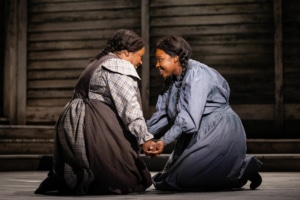DCPA NEWS CENTER
Enjoy the best stories and perspectives from the theatre world today.
Enjoy the best stories and perspectives from the theatre world today.
One of the most quoted sentences from Alice Walker’s novel The Color Purple is “I think it pisses God off if you walk by the color purple in a field somewhere and don’t notice it.”

Maiesha McQueen. Photo by Jamie Kraus Photography.
Walker grew up in Eatonton, Georgia in the 1940s, the youngest of eight children in a sharecropping family. It is in those cotton fields that Walker likely saw purple asters, the wildflowers that grow anywhere there’s soil in the state of Georgia. The radiance of those flowers contrasted the society that kept the family in poverty. Nature and the books her father brought home provided a sense of respite. Walker’s mother once told her that when Walker was a little girl, she found her scribbling letters with a twig in the dirt.
Years later, Walker returned to the color purple, this time as a metaphor for a woman named Celie who learns to find God in herself. At the beginning of The Color Purple, Celie is a 14-year-old girl in rural Georgia whose mother has died and whose father is progressively more abusive to her and her sister, Nettie. In the first half of the book, Celie’s letters to God recount her fears and trials being married to Mister, the widower to whom she was sold by her father. At one point she writes to Nettie, “The God I been prayin’ and writin’ to is a man and act like just like all the other mens I know: trifling, forgetful and low-down.”
The second half of the book is written as letters between Celie and Nettie. Through these letters, Walker shows how Celie grows into herself and inspires the women around her—Sofia, Shug and Squeak — to do the same.

Elexis Morton and Maiesha McQueen. Photo by Jamie Kraus Photography.
In 1983, Alice Walker became the first African American woman to win the Pulitzer Prize in Literature for The Color Purple. She also won the National Book Award for the book, which is her sixth novel. In 1985, it was adapted into a film directed by Steven Spielberg, and starring Whoopi Goldberg, Danny Glover and Oprah Winfrey.
Twenty years later, The Color Purple became a Broadway musical with book by Marsha Norman and music by Brenda Russell, Stephen Bray and Allee Willis. (It’s no coincidence that Norman also won the Pulitzer for her play ’Night Mother in 1983.) Then, the musical was revived and revised in a Tony Award-winning production in 2015.
The musical adaption of The Color Purple will be onstage at the Denver Center for the Performing Arts, March 31-May 7, 2023. This will be director Timothy Douglas’ third time at the helm of this piece, which he previously directed at Portland Center Stage and Signature Theatre in Washington, D.C. Douglas says that every time he encounters the work, he has a life-changing experience.
Douglas first read The Color Purple as an undergraduate student at Yale University in the 1980s. He says he cried three pages into the book and read it in one sitting. Douglas shared that he was abused as a child, and the novel and subsequently the musical, have helped him understand his experiences more clearly.

Domonique Paton, Angela Wildflower, David Aron Damane and the cast of The Color Purple. Photo by Jamie Kraus Photography.
“It articulated the pain I was feeling; I can count on one hand how many books have done that to me,” Douglas says. “It also helped me with insight into the pain my mother was going through that would get her to a place to be abusive. I recognized the behavior of the men and what underlies that. I don’t spend time defending the men, but the level of psychological turmoil that causes that abuse.”
This is similar to the journey Celie takes through the musical. At the beginning, she is downtrodden and looking for affirmation outside of herself. However, there is no relationship closer than the one with self, and Douglas tries to make every production feel intimate.
“The thing I try to do in every production, though it’s impossible, is to get back to the intimacy of the book where it’s just Celie and God,” Douglas says. “When I talk to my company on the first day of rehearsal, I tell them that.”
Maiesha McQueen, who plays Celie, recalls reading The Color Purple for the first time in high school, but she says she wasn’t fully able to receive it because she hadn’t found her own liberation yet. In the book, Celie and Shug find liberation through friendships and intimacy after being emotionally, physically and sexually abused by various men. McQueen believes a lot of women can relate to the way society suppresses women’s sexuality.

Maiesha McQueen and the cast of The Color Purple. Photo by Jamie Kraus Photography.
“I grew up like many women — in a very repressed space,” McQueen says. “I don’t think my parents knew it, and I wasn’t really churched, but there were these limited definitions of what a girl was supposed to do and be like. Things like attraction, desire, masturbation, fulfillment versus non-fulfillment, we didn’t talk about it.”
She previously played the role of Sofia in the musical at Portland Center and Maine State Music Theatre. McQueen also completed a Broadway run in Waitress: The Musical last year; and this is her fourth show with Douglas. As a full-figured woman, McQueen says that bodies tell stories and she believes that inhabiting the role of Celie will make audiences reconsider the story.
“There were certain casting choices made for the movie, so those images of the women and their bodies have been fixated in our minds,” McQueen says. “I was excited and interested in being able to be frail on the inside. When we think about women who are oppressed, abused and made to feel small, that does not discriminate based on what your body happens to look like.”
Having encountered the book, movie, and musical many times as an adult, McQueen is able to recognize the revolutionary nature of Walker’s hallmark work. Celie is the color purple — the divine creation that God deems worthy of celebration. Since chattel slavery, Black women’s bodies have been used, experimented on and criticized for capitalistic and patriarchal gains. In The Color Purple, Black women are regarded not for their usefulness, but for simply existing.
“The book brought home this idea of the divine feminine and the power of the Black woman to take her own happiness, sexual liberation and freedom,” McQueen says. “At the end of the show, Celie is still living in a racist and sexist society, but her understanding of her own divinity is her liberation.”
Douglas could not agree more. “Whether people acknowledge or not, Celie is never a victim of her circumstances,” he says. “She is always who she is, but through the story the women are like beacons that pull who she is at core to the surface. She doesn’t change; she becomes more realized and it’s the women around her who change. I think people see their self-resilience in her journey.”
DETAILS
The Color Purple
Mar 31 – May 7, 2023 • Wolf Theatre
Tickets
